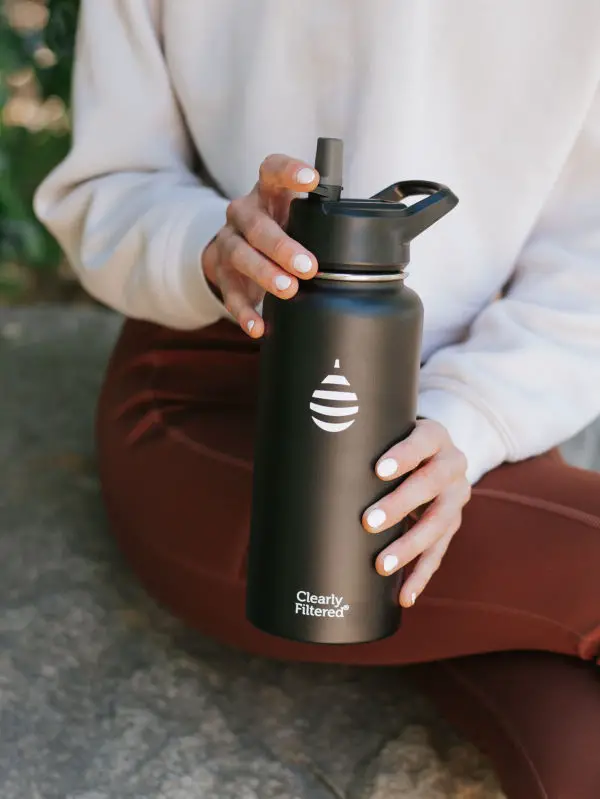Coconut water owes its unique flavor and ability to rehydrate to its rich potassium content. The fact coconut water is high in potassium and simultaneously low in sodium is what places it in the list of healthy foods and helps our body maintain a healthy electrolyte balance.
Coconut water was once only consumed fresh from the fruit in the regions to which the coconut tree is native (think tropical beaches and islands). Nowadays, this refreshing beverage is bottled and sold everywhere in the world as a popular source of carbohydrates and electrolytes.
Potassium, on the other hand, is an essential nutrient for human health that many people do not consume enough of – far less than the recommended intake anyway. In this article, we explain the positive and negative effects of potassium in the body. We also focus on the brands of bottled coconut water that contain high levels of this key nutrient so you can choose the best one for you.
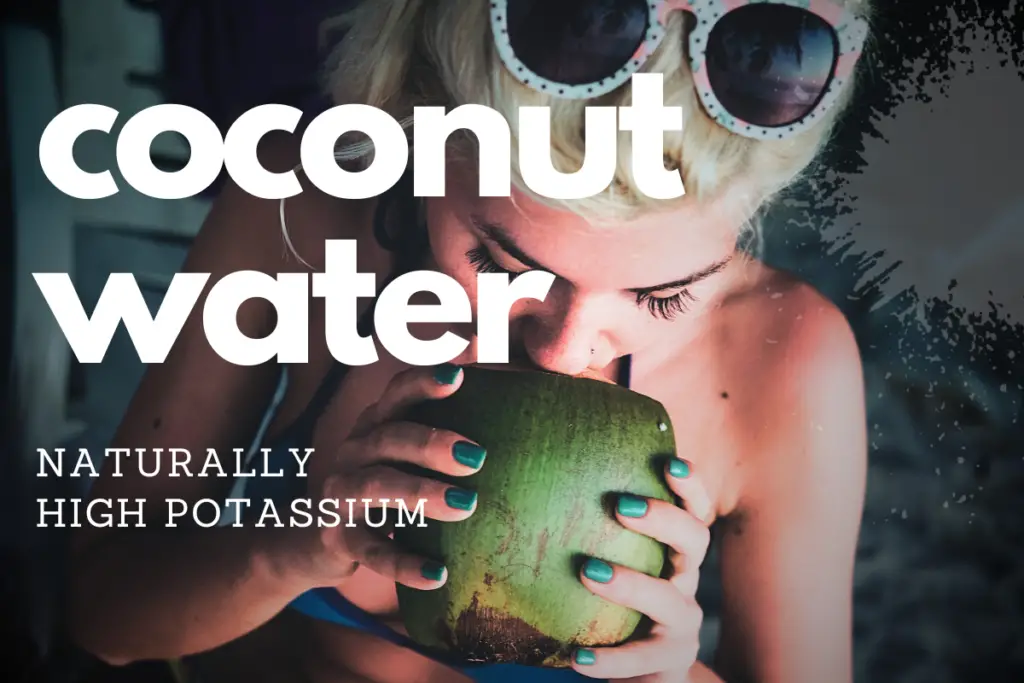
How much potassium do we need
Potassium levels in coconut water are substantially higher than in most other drinks. In fact, together with magnesium, potassium is the main mineral naturally present in all brands of coconut water.
At the same time, coconut water contains low levels of sodium, which adds up to a very healthy beverage in times when our diets are unfortunately lower in potassium and higher in sodium.
Potassium is a chemical element that is fundamental for plant and animal life because it plays an important role in how cells function.
In fact, potassium supports our nerve, muscle and heart cells, but having too little or too much potassium in our blood can cause us harm.
Effect of Low potassium
A low potassium level in our body can lead to:
- high blood pressure
- greater salt sensitivity
- increased risk of kidney stones
- increased bone loss.
It may even heighten our risk of heart disease or stroke.
Effect of High potassium
The human body has the ability to remove any excess potassium through urine and sweat, so it’s rare that anyone would suffer any negative effects from consuming too much of this mineral.
But there are reported cases of excess potassium intake from taking nutritional supplements, like sports drinks or vitamins.
Excessive amounts of coconut water have been shown in case reports to cause severe hyperkalemia, a potentially life-threatening electrolyte disturbance.
This is especially dangerous in people with renal disorders (or kidney disease).
Other physiological effects from having high potassium levels in our blood include
- dizziness
- headache
- muscle pain
- erratic heartbeat
- temporary paralysis
- tingling in the hands and feet
The toxicity of excess potassium can be made worse by aldosterone antagonist drugs, like Aldactone or Kerendia.
What does this all mean? It means too little or too much potassium in the body is fatal.
Recommended Intake
Having a healthy level of potassium is vital for our health, and the government advises a recommended daily intake of 4,700 mg for adults and children over 4 years of age.
Knowing how much we should have helps us work it into our diet.
Potassium is found naturally in many fruits (not just coconuts), like bananas, oranges and melons.
Vegetables, like cooked spinach, broccoli, potatoes and sweet potatoes are also high in potassium. It’s also abundant in seafood and dairy products.
Other potassium rich foods include
- beans and peas (around 1,300 mg of potassium per 100 g)
- nuts (around 600 mg of potassium per 100 g)
- vegetables such as spinach, cabbage and parsley (about 550 mg of potassium per 100 g)
- fruits such as bananas, papayas and dates (about 300 mg or potassium per 100 g).
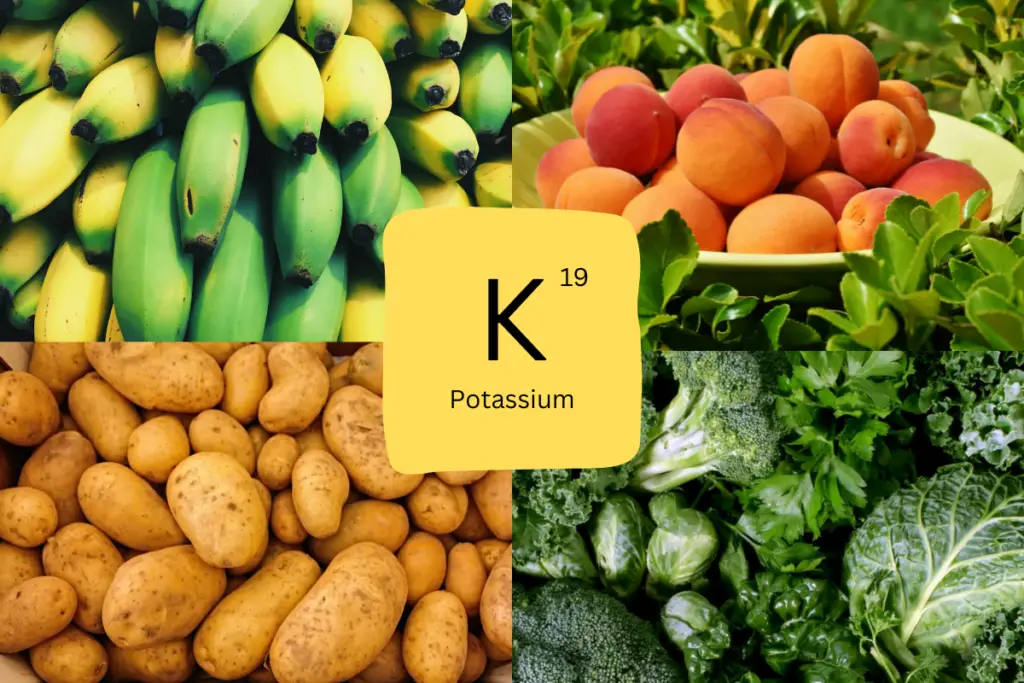
Fortunately, coconut water is also naturally high in potassium and can contain as much as 15% of our recommended daily needs. In fact, the high potassium levels in coconut water have also been shown to have a cardioprotective effect – an ability to protect our heart.
Coconut Waters High in Potassium
If you are looking for bottled coconut water that is especially high in potassium, you will like the following list. To put it together, not only did we check the labels for potassium levels, but we also made sure to choose brands that had relatively low amounts of sodium and no or low added sugars.
1. Vita Coco Pure Organic Coconut Water
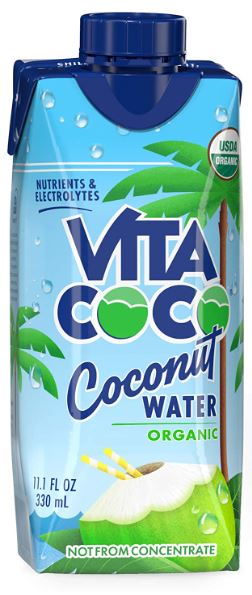
This coconut water by Vita Coco contains 10% of the required potassium daily value per serving. That’s 470 mg for every 8.4 oz of coconut water. There are 2 servings in every carton of Vita Coco, so it is sure to boost your potassium intake while also tasting great.
Vita Coco also has 26 mg of sodium and 15 g of sugar, which is all natural. In fact, this coconut water is USDA Organic-certified and completely free of added sugars.
2. Harmless Harvest Organic Coconut Water
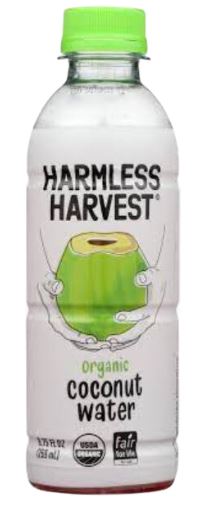
Harmless Harvest coconut water contains a whopping 812 mg of potassium in every bottle. That’s 15% of the required potassium daily value per serving (12 fl. oz / 355 mL), together with 55 mg of sodium and 23 g of sugar.
This coconut water is completely organic and the sugar it contains is 100% naturally produced by the fruit itself. Not only does this beverage not have added sugars, but it also doesn’t have artificial colors, flavors or preservatives. It does have a healthy boost of natural antioxidants though – a great hydrating choice that is naturally high in potassium.
3. Zico Coconut Water
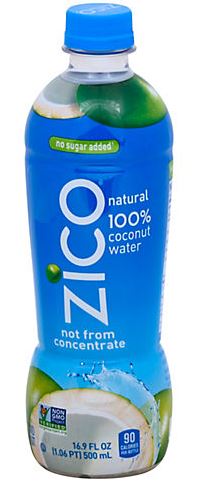
This coconut water by Zico contains 8% of the required potassium daily value per serving or 390 mg, together with 65 mg of sodium and 11 g of sugar.
Zico coconut water also contains great amounts of magnesium, phosphorus and calcium. But be mindful if you are on a sodium-restricted diet or have suffered from hypernatremia as this coconut water contains 3% of the recommended daily limit for sodium.
4. Naked Organic Coconut Water

Naked coconut water is made from the juice of almost 3 coconuts and contains 420 mg of potassium in every serve. That’s 8% of the required potassium daily value in every 8 fl. oz. serving of this delicious coconut water.
Every serving of Naked coconut water also contains 6 g of sugar, 45 mg of sodium and 40 calories.
5. Goya Foods Pure Coconut Water
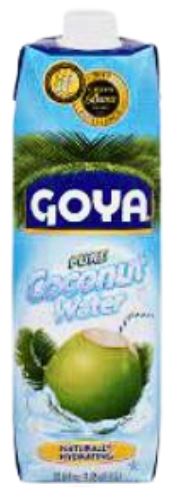
This coconut water by Goya Foods contains 15% of the required potassium daily value per serving, that’s an impressive 665 mg of potassium. Goya’s coconut water does have 2 g of added sugar, giving it a total of 16 g of sugar in every 11 oz (330 mL) serving.
It also contains 70 mg of sodium and 70 calories, so be mindful if you are trying to restrict your sodium or caloric intake
If you are concerned about your sugar intake, also read this guide on coconut waters without any added sugars.
Is coconut water a good source of potassium?
Coconut water is an excellent source of potassium and can contain as much as 15% of the recommended daily intake. It also has low levels of sodium, which help the body maintain a healthy potassium-sodium ratio. One cup of unsweetened coconut water has around 396 mg of potassium, a good part of the recommended daily intake of 4.7 grams.
In fact, the WHO encourages the ingestion of coconut water as a source of potassium in rehydration treatments for patients suffering from acute diarrhea.
However, there are also plenty of foods that contain potassium together with other essential nutrients, so we recommend against consuming just coconut water to maintain healthy levels of this specific mineral.
Including a good variety of vegetables and fruits in your diet is the best way to provide the body with all the minerals it requires to function properly. It is also worth noting that processing reduces the amount of potassium in many food products, and increases the amount of sodium. Another reason to consume a good variety of fresh foods.
The Best Water Filter Bottle We’ve Ever Used
Clearly Filtered | Stainless Steel Filter Bottles
We really love these filter bottles for keeping your drinks cool and contaminant free! They remove 99.9% of over 220 contaminants and use BPA-free plastics and double-walled stainless steel to produce some awesome looking designs with numerous bottle sizes for every situation. You can find them at Clearlyfiltered.com

